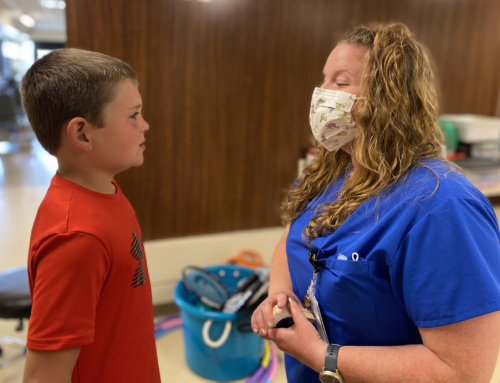By Lauren Glendenning, For Memorial Regional Health
September is National Childhood Obesity Awareness Month
About one in five children in the United States is obese, putting them at greater risk for many serious chronic health conditions and diseases such as sleep apnea, type 2 diabetes and heart conditions.
The Centers for Disease Control and Prevention reports that children with obesity are also teased and bullied more than average-weight peers, and are more likely to suffer from social isolation, lower self-esteem and depression.
“The environments that we live in nowadays are designed to promote frequent intake of high-calorie foods with hardly any nutrition to them. It is important that we start modifying our environments to promote healthful lifestyles,” said Madysen Jourgensen, registered dietitian at Memorial Regional Health. “Something as small as having fruit available for a ready-to-eat snack each day vs. something like pre-packaged cookies can really have a major impact on the food choices that we make.”
Factors that contribute toward obesity in children, according to the CDC, include too much time spent being inactive, lack of sleep, lack of places to go in the community for physical activity, easy access to inexpensive, high-calorie foods and sugary beverages, and lack of access to affordable, healthier foods.
How to Facilitate Healthy Behaviors
To support healthy growth in children, it’s up to parents and guardians to set a good example.
“Children learn so much through observation, so even just parents making healthful choices and taking care of themselves can teach children to do the same,” Jourgensen said.
Eat fast food only on occasion, if at all, and encourage children to drink water and demonstrate the behavior yourself, Jourgensen recommends.
“Sugar-sweetened beverages should not be a habitual thing,” she said.
Snacks and meals should always be consumed at the table rather than with a distraction such as the television, Jourgensen said. This promotes mindfulness, which Harvard Medical School defines as “focusing on the present moment, while calmly acknowledging and accepting your feelings, thoughts and bodily sensations.” Mindful eating is when you are fully attentive to your food as you buy, prepare, serve and consume it.
Helping Form a Healthy Relationship with Food
Jourgensen doesn’t like labeling foods as “good” or “bad” because it can cause children to feel shame in eating certain “bad” foods. Instead, she encourages parents to focus on the benefits of eating nutrient-dense foods while teaching mindfulness about portion sizes for high-fat, sugary foods.
“For example, we can talk with our kids about how eating a variety of different fruits and vegetables allows us to get all of the nutrients that we need to give us energy to run and play. We can apply this to any of our nutrients such as protein and muscle development, water and hydration, etc.,” Jourgensen said. “Another big one is to never forbid or restrict foods. This will create the idea of food as a reward and can contribute to skewed relationships with these foods later in life.”
It’s also important for parents to avoid talking about what they don’t like about their own bodies with or in front of their children. Jourgensen said parents who practice negative self-talk can unintentionally promote this as a learned behavior in their children.
Including your children in food preparation, even if it’s just giving them small jobs in the kitchen such as washing vegetables or peeling potatoes, can encourage more acceptance of different foods, Jourgensen said.
Prioritize Physical Activity
Kids who are more sedentary are also more likely to be overweight or obese. The American Heart Association suggests that televisions and other recreational screen-based devices be removed from bedrooms and absent during meal times, according to a 2018 report.
“Daily device-free social interactions and outdoor play should be encouraged,” according to the report. “In addition, parents/guardians should be supported to devise and enforce appropriate screen time regulations and to model healthy screen-based behaviors.”
Research shows that sedentary behavior and screen time is also bad for mental health and is linked to conditions such as depression and anxiety in adolescents.
In addition to placing restrictions on screen time, the best way to encourage children to be more active is to play with them, Jourgensen said. Families should go to the park together, take walks, go for bike rides and hikes and participate in other forms of outdoor recreation.
“Physical activity at a young age should be in the form of play, as children will develop much healthier responses to activity if what they are doing is fun — they don’t need to know that it is ‘exercise’ per se,” Jourgensen said. “Encourage them to get involved in sports. Team sports can be really great to promote enjoyment of physical activity and help promote healthful behaviors in children later in life.”
Prevent Picky Eating at MRH
Madysen Jourgensen, registered dietitian at Memorial Regional Health, said it’s important to introduce children to a variety of foods with different tastes, textures and smells at a very young age. Children tend to be more receptive to new foods at younger ages, and research shows that children need to try a food upwards of 10 times before they know if they prefer it or not.
Nutrition counseling is available to both children and adults, offering advice, education and tips for following a prescribed diet at home, as well as offering information about the reasoning behind a diet prescription. The team is available to anyone, with or without a provider referral, for providing nutrition-related tools and support that will help improve overall health. Call 970-826-2400 to make an appointment.





![Well-child checks vs. sports physicals — what’s the difference? [INFOGRAPHIC]](https://memorialregionalhealth.com/wp-content/uploads/Well-Child-Checks-vs.-Sports-Physicals-Image-500x383.jpg)
